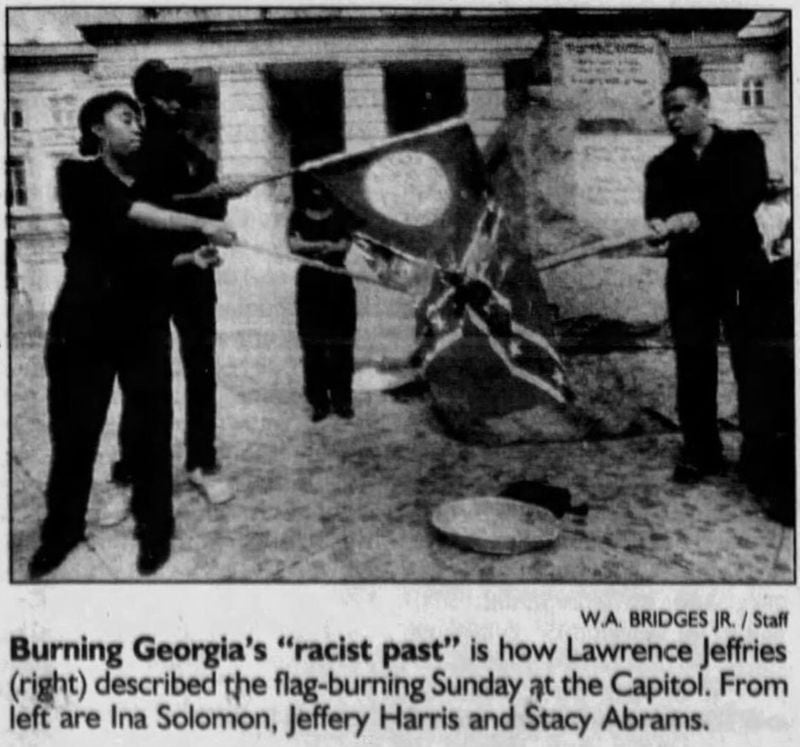Stacey Abrams’ campaign confirmed she participated in the burning of the Georgia state flag bearing the Confederate battle emblem during a protest at the Capitol more than 25 years ago, as images circulated on social media that injected a new debate in the race for governor.
The Democrat’s campaign said it was part of a “permitted, peaceful protest” against the Rebel insignia, and her supporters hoped the news would help further motivate her voters to surge to the polls. She’s relying on a range of new voters, many of them minorities, for her bid to become the nation’s first black female governor.
Her opponent, Republican Brian Kemp, did not immediately comment as the images proliferated online among his supporters. He’s tried to brand her as a “radical extremist” who would undo the legacy of Gov. Nathan Deal and other Republican leaders, and some of his allies said the picture reinforced that attack.
The image began spreading on Monday night – the eve of the first televised debate between the candidates – and was pulled from a June 1992 article in The Atlanta Journal-Constitution that showed Abrams and others burning the flag on the steps of the state Capitol. The caption identifies her as “Stacy Abrams.”
In a statement, Abrams’ campaign said Georgia was “at a crossroads” during her college years, swept up over racially divisive issues that included the symbol of the Confederacy on the state flag.
“This conversation was sweeping across Georgia as numerous organizations, prominent leaders and students engaged in the ultimately successful effort to change the flag,” the statement said.
The protest occurred just as then-Gov. Zell Miller launched a bid to remove the battle emblem from the state flag, which had been attached during 1950s fights over segregation. Miller was unsuccessful, and it nearly helped cost him re-election in 1994.
The emblem had been a source of controversy in Georgia since it was attached to the flag in 1956 during a period of “massive resistance” against the U.S. Supreme Court’s landmark decision to end school segregation.
The flag was finally hauled down in 2001 after a vote engineered by then-Gov. Roy Barnes that resulted in a new flag that minimized the size of the Rebel emblem. The move infuriated "flaggers," who dogged the Democratic governor and contributed to his defeat in 2002.
The flag-burning rally in 1992 took place just weeks after violent clashes that erupted across Atlanta after the Rodney King verdict. Abrams was quoted in the newspaper article detailing the abusive anonymous phone calls she received because of her role in the protest.
“It’s been unsettling,” she said. “I got a call from one woman who said her family died in the Civil War, and the flag was a symbol of Southern heritage. She said if black people didn’t like the flag, get the hell out.”
Ed Kilgore, writing Tuesday for New York magazine's website, recalled the protest.
At the time, he was the communications director for U.S. Sen. Sam Nunn and was at the Capitol that day for a meeting.
He noted the tense atmosphere following the King verdict and said that Abrams and the other flag protesters “were outnumbered not just by nearby riot police, but by Georgia Bureau of Investigation agents taking snapshots and trying to intimidate the young college students carrying out the protest.”
The demonstration that wet morning, he said, posed no threat to public safety or order.
“The rain probably extinguished the fire pretty quickly,” Kilgore wrote.
A ‘needle-mover?’
Abrams has been a vocal critic of Confederate imagery on state symbols.
Shortly after white supremacist rallies in Charlottesville, Va., she called for the removal of the carving of Confederate war leaders from Stone Mountain’s massive granite face. Noting the state-owned site’s link to the Ku Klux Klan, she said we “must never celebrate those who defended slavery and tried to destroy the Union.”
Kemp and other Republicans have cast her stance as a threat from the "radical left" to Georgia's historic monuments. "We should learn from the past – not attempt to re-write it," he said.
The flag-burning image triggered a split that mirrored the state’s political divide. Abrams’ backers commended her for destroying a divisive Confederate image and said it was unlikely to factor into the November race, while Kemp’s allies condemned her for burning a state symbol.
Chet Powell, an Abrams supporter, said “it’s likely to fire up both sides to a point, but I also think it’s mostly a dead issue now.”
“While some voters will key on it, I’ll bet that most of the older politicians want to avoid it,” said Powell, a retired law enforcement officer from Adel. “Frankly, it’s a done deal.”
Greg Williams, a Kemp backer, said he doesn’t see it as a “needle-mover” either – much like controversies that emerged in the final days of the 2016 election that didn’t have a profound impact on the outcome.
Still, the Atlanta public relations specialist said it violated a major taboo on the “don’t do” list for gubernatorial contenders.
“It’s just not a good headline two weeks before Election Day,” he said.
About the Author









